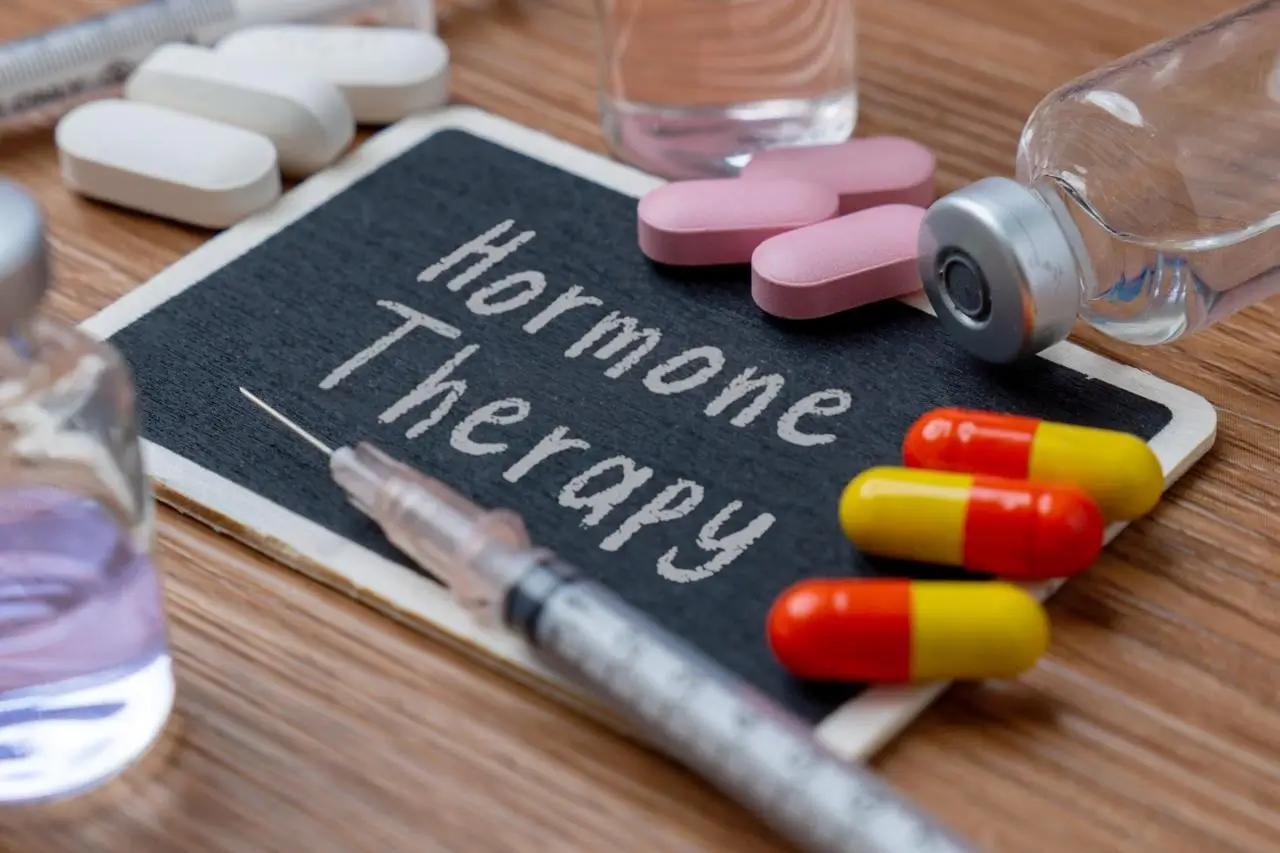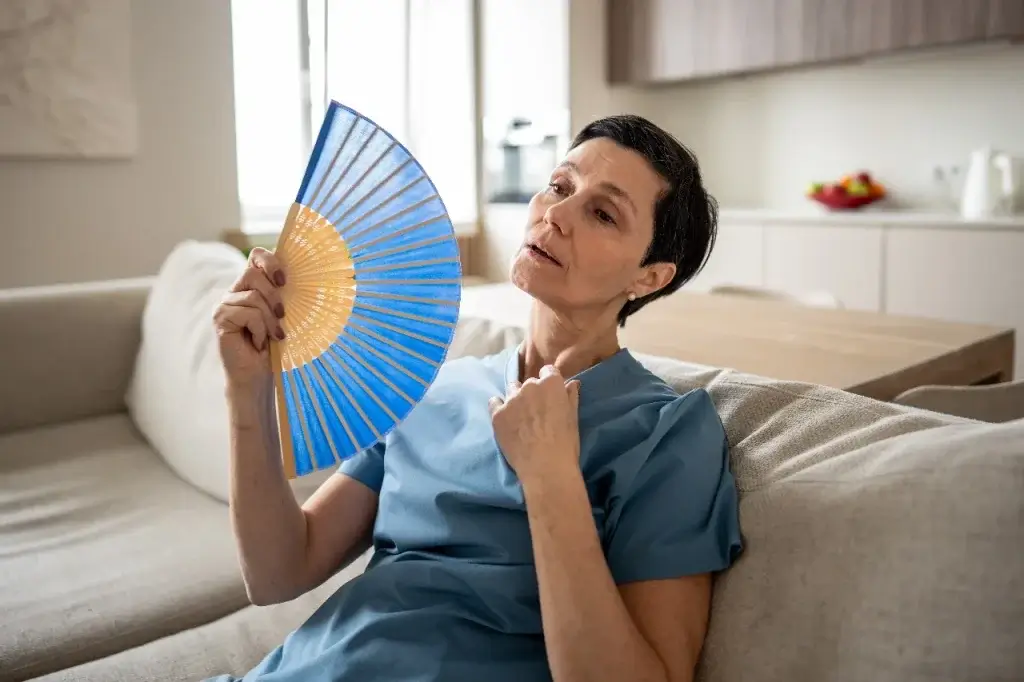

If you’ve ever suddenly felt heat rise through your chest…
your face flush…
your heart race…
your body break into a sweat for no reason at all —
You are not imagining it.
You are not “overreacting.”
You are not losing control.
You might be experiencing hot flashes, one of the most common and misunderstood symptoms of perimenopause and menopause.
And while millions of women live with hot flashes every day, very few are ever told why they happen — or what you can actually do to feel better.
This is your compassionate, clear, no-panic guide.
No shame.
No medical jargon.
No “just deal with it.”
Just understanding, support, and real options.
A hot flash is a sudden wave of heat that spreads through your body — usually starting in the chest, neck, or face — often followed by:
A flushed or red face
Rapid heartbeat
Sweating (sometimes intense)
Chills after the wave passes
Anxiety, restlessness, or a feeling of “heat trapped inside”
A hot flash can last 30 seconds to 10 minutes and can happen multiple times a day.
Hot flashes during sleep are called night sweats — and they can disrupt sleep, mood, energy, cravings, and metabolism.
Here’s the part no one tells us clearly:
Hot flashes are your body trying to find balance as estrogen levels shift.
Estrogen influences:
Body temperature regulation
Stress response
Blood vessels
The nervous system
When estrogen fluctuates (which happens during perimenopause, not just menopause), the brain gets mixed signals. It suddenly thinks your body is overheating — even when you’re perfectly fine.
So your body tries to cool you:
Blood vessels widen → face flushes
Sweat glands activate → sweating
Heart rate rises → heat disperses
This isn’t your body malfunctioning.
This is your body recalibrating.
It is adaptation, not failure.
Many women notice them before their periods fully stop.
Hot flashes can begin in:
| Stage | What’s happening | Hot Flash Likelihood |
|---|---|---|
| Late 30s – Early 40s (Perimenopause) | Estrogen starts fluctuating | High — this is when many women first feel them |
| Around Menopause (Periods stop 12 months) | Estrogen drops significantly | Very common |
| After Menopause | Hormones settle at lower levels | Hot flashes may continue, but often become less intense |
Yes — hot flashes after menopause are still normal.
They don’t mean something is wrong.
Sometimes hot flashes show up for other reasons — especially when stress or hormones are involved:
Stress & anxiety (cortisol spikes heat your body)
Thyroid imbalance
Blood sugar swings (skipping meals, cravings, overeating)
Alcohol, especially red wine
Spicy food, sugar, caffeine
Certain medications
B12 or magnesium deficiency
Poor sleep
This is why lifestyle shifts can be powerful — your biology is listening.
You do not need to “push through.”
You also don’t have to overhaul your life overnight.
When glucose spikes, cortisol rises. When cortisol rises, hot flashes intensify.
What helps:
Eat every 3–4 hours
Pair carbs with protein + healthy fat
Avoid skipping meals
Example:
Instead of just toast → Go toast + eggs or toast + paneer or toast + peanut butter.
Small changes. Big steadiness.
Stronger muscles = more stable estrogen + better stress regulation.
You do not need the gym.
You need:
Squats
Push-ups (wall push-ups count)
Glute bridges
Light weights or resistance bands
Your body learns safety through movement, not exhaustion.
Hot flashes are partly a nervous system sensitivity response.
Simple resets:
Slow nasal breathing (4 seconds in, 6 seconds out)
Warm showers instead of hot
Journaling before bed to reduce emotional load
Legs-up-the-wall for 2 minutes during overwhelm
Your nervous system learns calm by being shown calm.
Many women are low in magnesium — especially if stressed.
Look for:
Magnesium Glycinate (for anxiety, sleep)
Magnesium Citrate (for sluggish digestion)
These support:
Sleep
Mood
Muscle relaxation
Nervous system balance
(At Miror, we use gentle, clinically-dosed forms made for midlife women — no surprises, no fillers such as India’s most loved and a fan favourite: Miror Thrive!)
Hot flashes after menopause can feel confusing — especially when you were told they’d “eventually go away.”
Thrive helps soothe these heat surges by gently supporting your body’s natural estrogen receptors with plant-based phytoestrogens that restore balance, calm the nervous system, and stabilize temperature regulation.
Instead of sudden waves of heat, flushed skin, or night sweats that disrupt your sleep and peace, Thrive works slowly and steadily to help your body find its natural rhythm again. It’s not a quick fix — it’s a daily anchor. A way to feel cool, grounded, and at home in your body once more.
This is the most effective treatment for moderate to severe hot flashes.
It:
Improves temperature regulation
Supports sleep
Helps mood
Protects bone + heart + brain health
If you’re unsure whether it’s right for you:
→ Speak to a menopause-trained clinician, not just any doctor.
The goal is personalized, thoughtful support, not a one-size prescription.
It varies, and no, you don’t need to fear a decade of misery.
For most women:
2–4 years on average
Some experience them longer (especially without support)
With the right strategies, hot flashes often become milder + less frequent + easier to handle
Your body is not stuck.
It is moving — shifting — adapting.
Healing is absolutely possible.
There is no single magic pill — but there are categories that work:
| Type of Support | Works Best For | Examples |
|---|---|---|
| MHT/HRT | Moderate–severe symptoms | Estrogen patch/gel + progesterone |
| Supplements | Mild–moderate symptoms | Magnesium Glycinate, Vitamin B6/B12, Omega-3 |
| Herbal & botanical | Gentle support | Black cohosh, Shatavari, Red clover, Ashwagandha |
| Lifestyle Supports | Overall steadiness | Strength training, balanced meals, nervous system care |
The best plan is layered, not extreme.
If you wake up drenched, restless, anxious, or wired-tired — it’s not “just aging.”
Night sweats are your body signaling overwhelm.
Helpful bedtime shifts:
Light protein + healthy fat before bed (e.g., bowl of curd or handful of nuts)
Avoid alcohol (especially after 6 pm)
Magnesium (1–2 hours before sleep)
Keep your bedroom cool
Your sleep is worth protecting.
Your mornings will thank you.
You are not weak.
You are not late.
You are not falling apart.
You are transitioning.
Your body is trying to keep you alive.
Your body is asking for new care — not old discipline.
This is a rite of passage — not a punishment.
The goal is not to “get back to who you were.”
The goal is to grow into who you are now.
And she is wise.
She is powerful.
She is becoming.
Miror is here for you.
We support women through:
Hot flashes & night sweats
Mood & emotional shifts
Strength, bone & metabolic health
Cognitive clarity & sleep
With:
✔ Specialist consults (OB GYNs, GPs and Nutritionists and much more)
✔ Science-backed midlife supplements
✔ A supportive community of women who get it
Start here:
https://miror.in/free-consultation/
(Your first call is free, gentle, and without any judgment at all!)
Hot flashes are closely linked to your nervous system. On days when you’re stressed, rushed, or overstimulated, your brain becomes more reactive — which can trigger stronger heat waves. On calmer days, your temperature control center stays steadier. It’s not random — it’s your nervous system responding to your emotional load.
It’s very real. Foods that spike blood sugar or increase internal heat — like coffee, wine, spicy foods, and sugary snacks — can trigger hot flashes in many women. But this doesn’t mean you must avoid everything. The key is noticing your pattern. Your body is always communicating — you’re just learning its new language.
Menopause is a transition — not a switch that flips off one day. Even after periods stop, the brain and nervous system continue adjusting to new hormone levels. For some women, this recalibration takes months; for others, a few years. Hot flashes don’t mean something is wrong — they mean your body is still settling into its new rhythm.
Hot flashes are uncomfortable, disruptive, and exhausting — but they’re not dangerous for most women. What matters is how they affect your sleep, emotional well-being, and daily life. If they interfere with your rest, concentration, or mood, that’s your cue to seek support — not because it’s serious, but because you deserve relief.
You absolutely don’t have to suffer through them. Many women find relief through a combination of:
• Plant-based and Science-backed phytoestrogens like Miror Thrive
• Stress & nervous system support
• Gentle movement & stable blood sugar
• Sleep restoration
Whether you choose natural support or medical treatment, the goal is the same: to restore comfort, calm, and steadiness in your body — not to push through pain.



 ×
×

